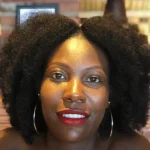Life has a way of unexpectedly throwing you a curve ball. This can happen at any time whether early or later in your journey, regardless of race, class, or gender.
So, what do you do when that happens?
How do you survive? How do you get through it?
Below I share a bit of my story about a curveball that happened to me very early in my life and the things that helped me get through it in hopes that they will be of help to others.
Table of Contents
My Story
My story begins in Uganda when my mum gave me away at the age of four, initiating my first experience of abandonment.
All I remember at the time was that one minute I was living with my mum and the next minute I was not. She had given me away to my father’s best friend in the hope that I would have a better life than she could offer me.
I hardly saw my mum after that, except on a few occasions. I was the product of a one-night stand between my parents, with my father coming from a more middle-class family than my mother.
My father, who I had never met and had only seen in photographs until his body came home for burial, had gone to the UK to make a better life for himself. However, he died prematurely of HIV in his twenties, at a time when the disease was still in its infancy and was greatly feared.
My First Abandonment
My father’s best friend, let’s call him Uncle Adam, had a family of his own, two daughters and a wife who was pregnant with their third child. He was a hard-working man who treated me like his own child and put me through school.
Unfortunately, his wife died during the birth of their third daughter.
His eldest daughter and I attended boarding school for primary. The middle one, however, was often ill and one day, after visiting us the week before, we received the news that she had died.
It broke my heart. Not only did it come as a shock because I had only seen her the week before, but also because she was still very young.
Uncle Adam often traveled to the UK, I assume for business, and one day he came back with passports for his eldest daughter and me. The plan, as I understood it, was that we would go to the UK with an aunt who we would stay with.
My Second Abandonment
When we arrived in the UK, plan A didn’t work out. So, it was onto plan B which involved us being dropped off at a social services office at closing time without any identification.
As a child, I did not understand what was happening but trusted that the adults around me had my best interests at heart.
Before we were taken to social services, we were given a false surname and told to tell a story claiming that we were sisters. But that didn’t last long, because the truth came out after just a few weeks in care.
The lady who took us in that day was only meant to keep us for the weekend until they figured out where to put us come Monday. Fortunately, I ended up staying with her for the duration of my care experience.
I can’t tell you how I felt.
I was about 10 years old and had left the familiar surroundings and people in Uganda for the complete opposite in the UK. I remember social services and my foster mum telling us that we had been abandoned, and it took me a while to realize and accept that.
My New Life
It was very hard for Uncle Adam’s daughter to accept that her dad had abandoned her, so social services had to find her dad and she returned home with him. I remember being taken from the school to social services when they found him and being asked if I wanted to go back with him too.
At that point, I felt numb towards him because I had accepted that he had left us, so I decided to stay in care. The girlfriend he was with at the time later told me that it was a good decision to stay because if I had gone back, I would have been looking after the youngest daughter who was disabled.
Since that day, I have never seen or heard from him or his eldest daughter. As a child, I couldn’t understand how the person I trusted so much, and who my mum trusted to look after me, had left me in a foreign country with strangers.
I stayed in care for about 7 years and moved out to live on my own when I was 18. Needless to say, this stroke of fate was unexpected and changed my life.
It’s not easy to live through abandonment, but I’ve learned a few things along the way that have helped me deal with it.
Dealing With Abandonment
1. Acceptance
Learning to accept the situation I was in helped me to understand it better and deal with the difficulties it brought. Fighting and resisting would not have made the situation easier, but rather would have destroyed my mental health.
It was not easy to accept that I had been abandoned not only by my mother but also by the man I had called dad because they were people I trusted to love and care for me. But sometimes life puts us in difficult situations through no fault of our own
Accepting life’s challenges may not always make them easier, but it helps you find better ways to approach them. Resisting them can block this ability because you focus too much on the problem and not the solutions.
2. Independence
Being abandoned made me independent faster than I might have been if it hadn’t happened. I learned to rely on myself when I realized I couldn’t rely on others to look after me.
I also had to prepare myself to live independently at the age of 18 so had no choice but to grow up.
I was independent for so long that even now in my thirties I still find it hard to ask for help. I know that’s not always a good thing, because no man is an island, but independence at a young age helped me better manage my expectations of others.
Independence can save you a lot of disappointment from others, which is inevitable because no one is perfect. When others are not able to be there for you, you can always rely on yourself.
3. Vulnerability
Having been abandoned, I’ve had to relearn the value of vulnerability due to not having a lot of trust in people which has made me a little hard-hearted.
We connect more through our vulnerabilities than our strengths because it allows us to recognize each other’s humanity.
I never wanted to be vulnerable or appear that way, so I didn’t talk much about myself. Firstly, because I didn’t want to be seen as a pity case and secondly, I didn’t want anyone to take advantage of me because I had no one.
But over time I’ve realized that my most vulnerable moments have brought me closer to people. They’ve inspired others to know that they were not alone and they have enabled me to get the right support when I needed it most.
Remember being vulnerable is a sign of strength, not weakness because it truly takes a strong person to share parts of themselves that they would rather others not know, not realizing that these are the parts that connect all of all.
4. Forgiveness
When you are deeply hurt by the people you trust, forgiveness is almost always the last thing that comes to mind, especially when you have little to no understanding of the reasons for what they did.
Being abandoned by my mother and then by my father figure left me angry for a long time until I was confronted with my past. My mother had been looking for me and reached out to me first through social services and later through her friends here in England.
The man I had once called dad never got in touch, but his former girlfriend, whom I had met shortly after leaving care, did. Talking to these people from my past or those who knew my mother helped me to understand what happened and why.
This information allowed me to empathize and begin my journey to forgive those who had abandoned me. Furthermore, the realization that forgiveness was more for me than for the other person also helped to heal the wounds of my past.
It was not easy to forgive, but it was necessary for my healing to let go of the past so that I could enjoy the present and live for a better future.
For all of you out there going through your healing journey, allow yourself to feel what you feel, because your feelings are valid, but in the end, forgive as a form of self-love. You are doing it for you and not for them because you are worth it.
I have since returned to Uganda to visit my mother and we now have a good relationship.
Words of Encouragement
Unexpected curveballs can come in many different ways. How you handle them depends on your unique circumstances, but with the right attitude, you can overcome anything life throws at you, turn it around, and use it to your advantage.
I could have allowed what happened to me to break me, but I did not. I could have used it as an excuse to go down a dark path, but I did not.
I could have wallowed in self-pity, but I did not because I had purposed it in my mind from the beginning that this would not be my story.
Don’t underestimate the power of your mind when it comes to getting through difficult times. Whatever you set your mind to do will happen, so focus on your goals even when things get tough.
Remember that it is through these challenges that we learn our most valuable life lessons, preparing us for the next stage of our journey, which is often bigger and better than the one we are in now.


